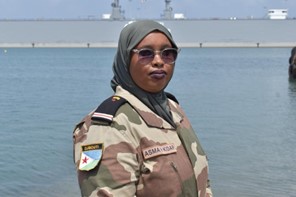UNODC Eastern Africa News and Stories
You are here: Home / News
Seas of Knowledge: Female Coastguard Officer Guides the Way in Maritime Law Training
 Djibouti, located in the Horn of Africa, serves as a critical gateway between the Red Sea and the Gulf of Aden. This location places it close to major international shipping routes, making it a hub for maritime trade. However, this strategic position also makes it susceptible to various maritime crimes.
Djibouti, located in the Horn of Africa, serves as a critical gateway between the Red Sea and the Gulf of Aden. This location places it close to major international shipping routes, making it a hub for maritime trade. However, this strategic position also makes it susceptible to various maritime crimes.
The United Nations Office on Drugs and Crime Global Maritime Crime Programme (UNODC GMCP) organised two Boat Crew Member Qualification Training Courses (BCM QTC) for 21 officers. The training consisted of theoretical and practical components, focusing on navigation, search and rescue operations and maritime law enforcement techniques. The training was accompanied by a Train the Trainer (TOT) programme for two officers to add sustainability of expertise within the Djibouti Coast Guard (DCG).Top of Form
Among the officers selected for the TOT programme was Asma Kidar, a Chief Petty Officer who has served at the DCG Nautical Department since 2018. She completed the first of the two BCM QTCs and then started on the TOT programme.
BCM QTCs and then started on the TOT programme.
In an expression of dedication to her career of national service, she commented, "I am happy to become the first female trainee instructor, and I will continue to share my experience and conduct training abroad or in Djibouti. My goal is to continue working for my country through UNODC."
She played a crucial role as a national instructor supporting the UNODC Maritime Law Enforcement (MLE) Mentor during the second BCM QTC, working alongside her colleague, Hassan, who was also chosen to participate in the TOT programme. Together, they worked to further develop their expertise and knowledge on delivery of the course material sessions while supporting implementation of the second course.
During the first training phase of the TOT training, Asma and Hassan were provided with comprehensive instruction on effective teaching techniques and strategies to become skilled instructors. “I acquired a solid foundation in pedagogy, equipping me with the skills to instruct diverse tasks such as navigation, knots, and first aid. The training also provided me with valuable insights into effective communication techniques and creating engaging lesson plans,” said Asma.
In the second phase of the training, they were each given the opportunity to apply their newly acquired knowledge by taking the lead in teaching specific lessons, while receiving guidance and support from the mentor.
“My involvement included actively participating in practical demonstrations and simulations aimed at elevating the overall learning experience for the officers,” said Asma.This hands-on experience allowed the two trainee instructors to develop their teaching abilities further and gain valuable insights into the practical aspects of managing a training course.
UNODC MLE Mentor Fabien Xuan said, "Involving national instructors has had an immediate, positive impact on officers. These trainee instructors possess an in-depth understanding of how the various departments operate. Beyond this, they can establish a schedule that better integrates with their local culture, which has provided a more comprehensive and culturally sensitive training approach."
This sentiment was reiterated by DCG Liaison Officer Ilhan Abdallah, “We now have two trainee instructors for the Djibouti Coast Guard. Their presence signifies a crucial milestone and opens a gateway for profound knowledge transfer and substantial capacity-building within the DCG. This marks a pivotal moment, elevating the force's capabilities,"
This project is supported by the US State Department Bureau for International Narcotics and Law Enforcement Affairs (INL) through the Disruption of Arms Smuggling and Associated Maritime Crime in the Horn of Africa and the Gulf of Aden project.
For more information, please contact:
Mr. David O’Connell (David.OConnell@un.org)
Western Indian Ocean Programme Coordinator
Global Maritime Crime Programme
United Nations Office on Drugs and Crime
Click here to visit the UNODC Global Maritime Crime Programme website.